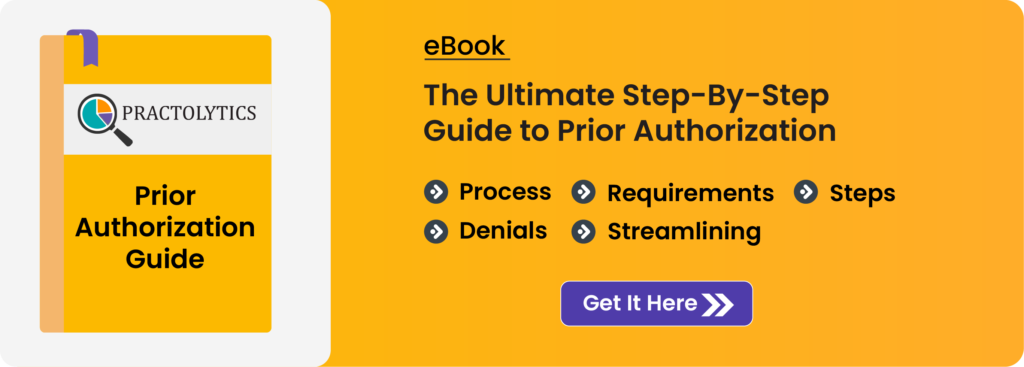Why Prior Authorization Delays Patient Care
In the healthcare industry, Why Prior Authorization Delays Patient Care remains one of the most frustrating challenges. Patients face long wait times for tests, treatments, and prescriptions, while providers struggle with paperwork, denials, and revenue loss. This blog explores the impact on patients and practices, the reasons behind by prior authorization delaying care, and the latest 2025 developments such as digital systems, artificial intelligence tools, and gold carding programs. We share data, statistics, and a real-world example of how automation improves outcomes. Discover how Practolytics accelerates approvals for better care and stronger trust, along with actionable strategies to reduce delays.
Table of Contents
Why Does Prior Authorization Cause Delays in Patient Care?
In 2025, prior authorization remains a top pain point for healthcare. Here’s the problem: before doctors can order tests, treatments, or prescriptions, they must get approval from insurance companies. What should be quick often drags out.
Patients will experience additional stress and care delays as a result. It means mountains of paperwork, rejected claims, and lost revenue for medical practices.
Why does prior authorization slow down patient care? We’ll break down the causes, the real-world impact, and how new solutions are fixing this in 2025.
What Is Healthcare Prior Authorization?
Prior authorization is a business step where insurance verification companies review a doctor’s request for a test, procedure, or medication before a patient receives it.
- Doctors provide patient details.
- The Medical insurance companies checks coverage.
- If approved, treatment moves forward. If denied, the process adds delays.
Insurers see this as cost control. Both physicians and patients frequently see it as an additional complexity and a roadblock to prompt care.
Why Prior Authorization Causes Delays
1. Complex Rules That Keep Changing
Not everyone is subject to the same insurance regulations. For various employers or plans, even one payer may have different regulations. Additional documentation may be required today for a treatment that was approved last month.
Impact: If providers don’t follow the rules, their claims will be denied. Delays of days or weeks are added by this back and forth.
2. Manual Submissions and Paperwork
Many practices still obtain approvals via fax, phone, or email today. Manually completing tasks results in more mistakes and slower responses.
Key Takeaway: Despite the availability of digital tools, 85% of providers claim that approvals are primarily done by hand.
3. Lack of Staff Time
Clinic staff are overworked. Every day, they manage patient appointments, medical billing services, and documentation. Direct patient care is delayed while pursuing insurer approvals.
4. More Services Need Approval
Insurers continue to add new products, such as medications, devices, and therapies, to their approval lists in an effort to control costs.
2025 Update: Stricter regulations now apply to speciality medications and sophisticated imaging (such as MRIs). Longer wait times, more requests, and more reviews result from this.
5. Slow Approval Timelines
Days may pass before urgent approvals are granted. Regular ones could take up to 14 days. Every day counts for patients awaiting surgery or pain relief.
Impact on Patients
1.Delayed Care Hurts Patients
Patients with serious conditions like cancer, heart disease, or chronic pain often wait too long for tests and treatments. These delays harm their health and daily lives.
2.Frustration Over Insurance Decisions
When insurance companies, not physicians, make decisions about whether or not to provide care, patients experience anxiety. This makes people less trusting of the system.
3.Loyalty is harmed by unexpected bills.
Patients may receive unexpected medical bills if approvals are not obtained. These costs hurt satisfaction and loyalty.
Key Insight:
A 2024 survey shows 94% of doctors say prior authorization delays care. 33% report it leads to serious harm.
Impact on Providers
1.Lost Revenue
When insurance companies deny pre-approvals, patients can’t get care on time. This means canceled appointments and lost income for clinics. Staff also waste valuable time fixing payment rejections.
2.Increased Admin Work
Every week, your team devotes hours to contacting insurers, completing paperwork, and locating approvals.
Relevant fact: Each physician spends an average of 14 hours a week performing these duties.
3.Burnout and Low Morale
Too much paperwork and too little patient time frustrate teams. This drains energy and hurts workplace spirit.
Trends and Updates in 2026
1. Digital Prior Authorization Systems
CMS will require electronic prior authorization by 2026 for Medicare Advantage, Medicaid, and some private plans. Many insurers are switching to digital systems as early as 2025.
2. AI for Faster Approvals
New AI tools help predict approval odds and guide staff in preparing error-free requests faster.
3. Push for Transparency
Patients want clear answers upfront: What needs approval? How long? What will it cost? Clinics that share this information build stronger trust.
4. Gold Carding Programs
Some insurers are testing “gold carding.” Providers with high approval rates may skip prior authorizations, speeding up patient care.
Key business takeaways:
- To prevent bottlenecks in 2026, make plans for digital shifts now.
- AI can reduce staff workload and approval delays.
- Transparency drives loyalty—patients choose clarity.
- Track your approval rate—it could reduce future paperwork.
Real-World Example of a Clinic’s Struggle
A mid-sized heart clinic in Ohio faced a problem in 2024. Many patients needed MRI and heart scans, but 35% of these requests got denied at first. Each denial caused delays—about 20 extra days for patients to get care.
This frustrated patients. Some left for other clinics.
Here’s how the clinic fixed it:
- They started using an automated system for approvals.
- Staff got monthly training on insurance rule changes.
- They made a simple checklist to avoid missing paperwork.
Result: Faster care, happier patients, and fewer people leaving.
Results after 6 months:
- Claim denials fell by 40%.
- Approvals now occur 50% more quickly.
- Patients are happier and have greater faith in us.
Best Practices to Reduce Delays in Patient Care
Utilize easy-to-use software that integrates with your EHR system to automate prior authorizations services. This saves time and reduces the amount of manual paperwork.
- Keep Up with Payer Regulations: Every month, check for updates. This maintains revenue flow and helps prevent claim denials.
- Regularly Train Your Staff: Big delays can result from small mistakes. Everyone remains effective and sharp with regular training.
- Monitor Patterns and Denials: Determine which payers or services are the most problematic. Apply this knowledge to solve issues quickly.
- Communicate Clearly with Patients: Outline the steps and expenses up front. Being truthful lowers surprises and increases trust.
Lessons Learned:
- Delays in prior authorization harm both your company and your patients.
- For today’s healthcare, manual systems are too slow.
- Intelligent tools reduce wait times, maintain compliance, and improve patient satisfaction.
Conclusion:
Outsourcing Prior authorization problems in 2025 caused delays. They upset patients and waste your team’s time. But there’s a better way.
Practolytics helps your practice:
- Automate prior authorizations and see approvals live.
- Reduce denials with correct, complete paperwork.
- Get updates when insurance rules change.
- Speed up care by cutting wait times.
- Build patient trust with clear cost and approval info.
With Practolytics, your staff does less paperwork and more patient care. Faster approvals mean:
- Better health outcomes.
- Steadier practice income.
- Stronger patient relationships.
Don’t let prior auth slow you down. Choose Practolytics for faster, accurate, confident care.
Read More – Prior Authorization Services for Podiatry : improving Patient Access and Care
Talk to Medical Billing Expert Today — Get a Free Demo Now!






